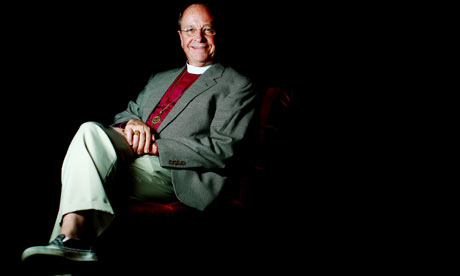
Gene Robinson, the Espiscopalian bishop of New Hampshire, says gay and lesbian clerby are treated by the Church of England as a problem to be solved. Photograph: Graeme Robertson
The first openly gay bishop in the Anglican communion has launched an outspoken attack on the Church of England and the Archbishop of Canterbury, Rowan Williams.
In an exclusive interview with the Guardian, Gene Robinson, the Episcopalian bishop of New Hampshire, criticised the policy of the Church of England towards gay and lesbian clergy. Alluding to the significant number of clergy who are gay, he said: "I think gay clergy in the Church of England are thought of as a problem to be solved or at least lived with, rather than a gift from God."
Robinson, who is in Britain to speak at the Greenbelt festival at Cheltenham Racecourse this weekend, added that he could not accept the archbishop's recent comments that if the Episcopal church refused to uphold the current moratorium on consecrating actively gay bishops or blessing civil unions, the communion might have to be reorganised into a two-tier, or "two-track" model. "I can't imagine anything that would be more abhorrent to Jesus than a two-tier church," he said. "Either we are children of God and brothers and sisters in Christ, or we aren't. There are not preferred children and second-class children. There are just children of God."
Asked whether Williams's softly, softly approach might in the end be more successful in persuading the communion than unilateral action by one church, he pointed out that the very nature of the communion — a loose agglomeration of equals — meant that national churches were always acting autonomously. Furthermore, someone had to make the first move.
"We [Episcopalians] virtually led the way in terms of the ordination of women. And I believe had we not done that the ordination of women in the Church of England perhaps would not have occurred when it did. And the discussion around the ordination of women bishops would not be occurring."
He compared the archbishop's strategy, unfavourably, with the church's dithering over the civil rights movement in America.
"I think there's always a tension between doing the just and right thing, and being as pastorally sensitive to everyone as possible.
"The church did not get involved in the civil rights movement in the United States for quite a long time, because of fear of offending those who disagreed with them. But at some point we decided that it was more important to do the just and right thing than it was to not offend those who disagreed.
"And so we joined in the civil rights movement for people of colour, and then tried to deal as pastorally as we could with those who disagreed. And I think that's the tension we face in the communion, of which Archbishop Williams would represent the long view, the gradual view, and the American church would represent, as best we can discern it, trying to do the right and just thing."
There may be a further test for the Anglican communion later this year, when the Episcopalian dioceses of Los Angeles and Minnesota are due to elect new bishops. Among those standing for office are one gay man and two lesbians.
Read the full interview in tomorrow's Guardian
No comments:
Post a Comment